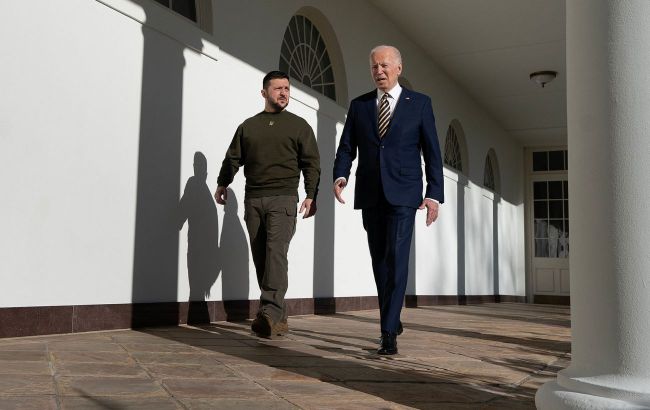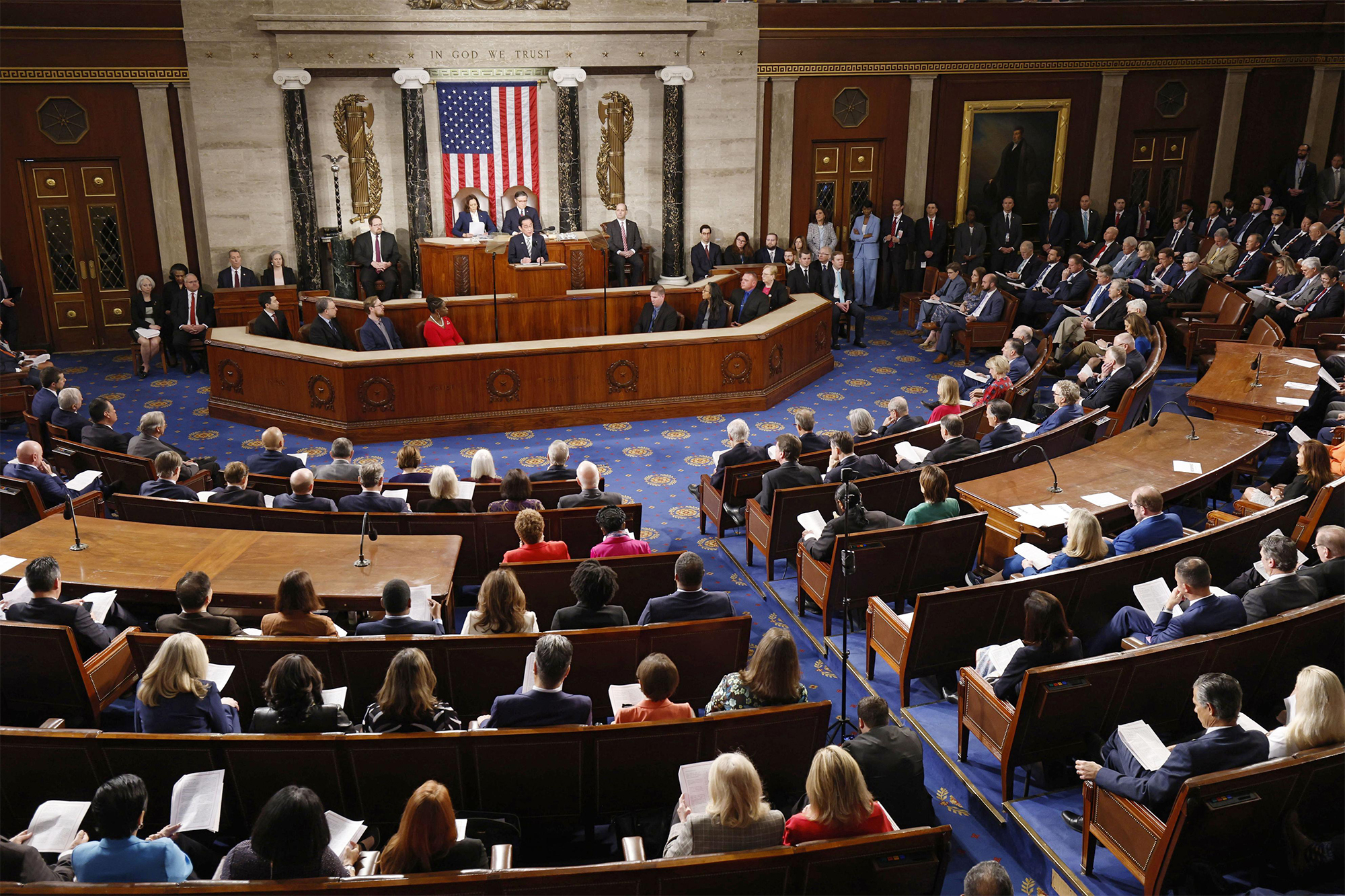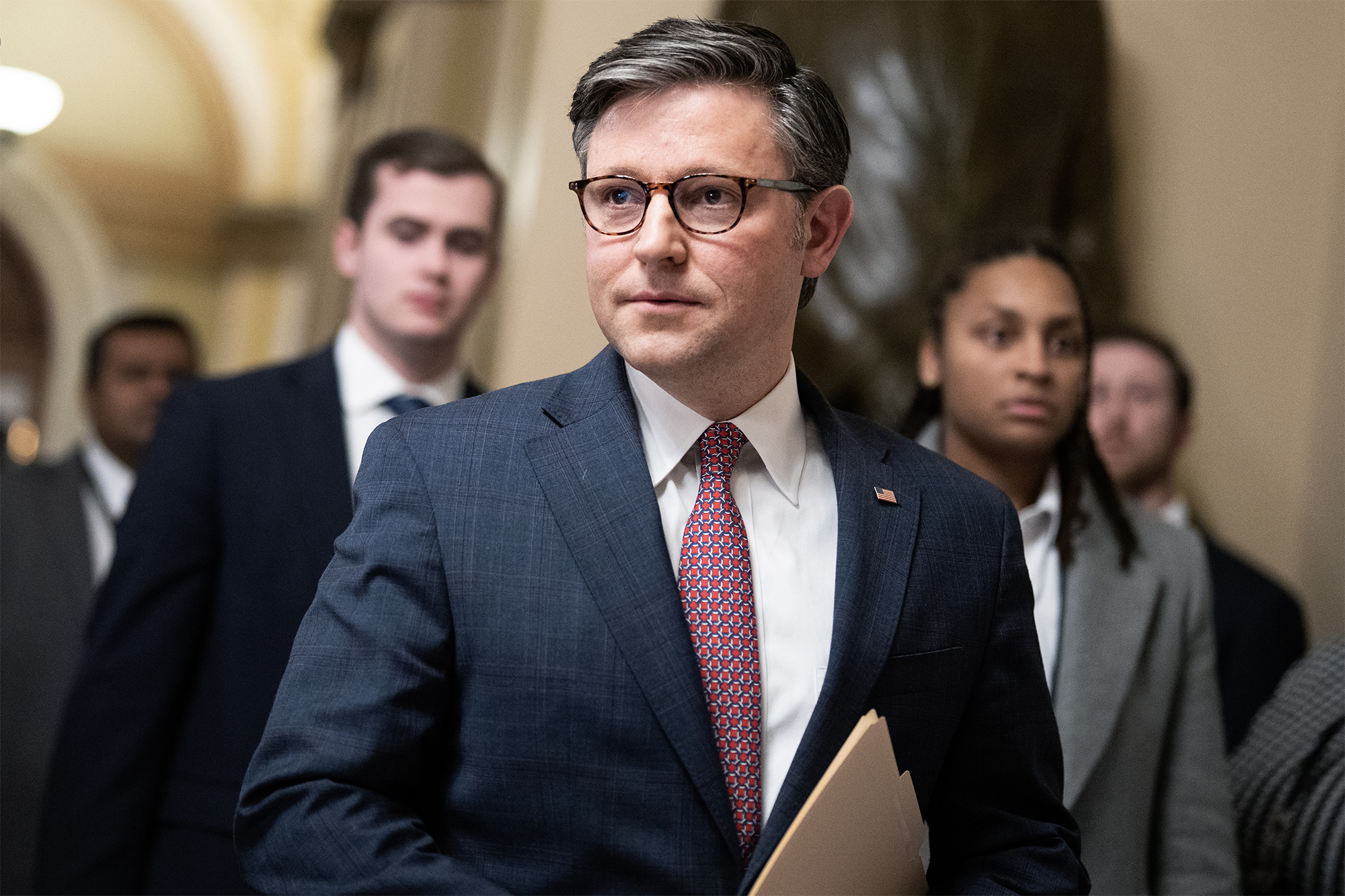Only step away from aid: Under what conditions and when Ukraine will receive funds from US
 Volodymyr Zelenskyy and Joseph Biden in the White House, Washington, USA (photo: Getty Images)
Volodymyr Zelenskyy and Joseph Biden in the White House, Washington, USA (photo: Getty Images)
The fate of critically important military and financial aid from the United States to Ukraine, totaling more than $60 billion, will be decided in the coming days. The terms under which the funds may be allocated and when they can be received can be found in the overview by journalists of RBC-Ukraine.
During the preparation of the material, the text of the bill proposing assistance to Ukraine was used, along with information from sources such as RBC-Ukraine within the government, including information from members of parliament, and comments from the Ukrainian ambassador to the USA.
Contents
- Assistance to the state budget
- Pension payments won't be covered
- Loan is not the best option
- When to expect credit funds
- Law on lending and REPO bundled together?
After several months of debate, the US Congress has finally settled on the format of aid to Ukraine, Israel, and Taiwan. Support will be allocated to each country through separate legislation. The drafts of these documents were published on April 17 (the bill for Ukraine).
For Ukraine, $60.8 billion is planned to be allocated, with $23.2 billion going towards replenishing American weapon stocks, $11.3 billion for ongoing US military operations in the region, and $13.8 billion for the purchase of advanced weapon systems, goods, and defense-related services.
Ukraine's budget could receive $7.85 billion.
Initially, funding was planned on a grant basis from the US budget. However, Republicans and Democrats failed to reach a compromise on this issue. As a result, it was decided to provide assistance in the form of a loan.
Assistance to the state budget
Funds will be available to the budget of Ukraine until September 2025, not just until the end of the current fiscal year in the United States (September 2024 - ed.). "This somewhat mitigates the risks that assistance could suddenly 'run out' in case of a policy correction after the presidential elections, regardless of the winner," said Danylo Hetmantsev, head of the financial committee of the Verkhovna Rada (Ukrainian Parliament).
At the end of 2023, funding for Ukraine from the United States ceased precisely because the budget year ended in September, and a new budget for 2024 could not be adopted.
Pension payments won't be covered
According to the bill, credit funds cannot be used for pension payments. This does not mean a prohibition on indexation or any other increase in pension payments.
Sources familiar with the document informed that the US credit simply cannot be used for the specified purposes. "If necessary, other sources of funds will be used for pension payments, including increasing them as a result of indexation," said an interlocutor to RBC-Ukraine.
According to Yaroslav Zheleznyak, deputy chairman of the parliamentary committee on finance, tax, and customs policy, one should not interpret the prohibition on spending funds for pension payments as "treason" - it all comes down to the peculiarities of American legislation.

United States Congress (photo: Getty Images)
According to the bill, U.S. support cannot exceed 50% of the funding provided by all donors.
This condition does not pose risks for Ukraine at the moment. The Ukraine Facility program from the European Union, which is already in the final stages of launching, provides for €50 billion in funding by 2027. For the current year, it includes €16 billion in support. In addition to this, funding from the IMF and other partners is expected. Therefore, the share of the US loan is significantly less than 50% of the total amount of financial support for Ukraine.
However, as Danylo Hetmantsev asserts in a comment for RBC-Ukraine, thanks in part to the funds from the US for the next year, there will be enough money to cover planned budget expenditures.
Monitoring and oversight of the use of funds will be conducted under the enhanced control of the US Secretary of State and USAID.
Loan is not the best option
Undoubtedly, it would be more beneficial for Ukraine to receive non-repayable support. However, in the current situation of critical financial shortage, Kyiv is ready to agree to any conditions. "If Ukraine were offered credit assistance today or free assistance tomorrow, we would agree to today," said Ukrainian President Volodymyr Zelenskyy recently.
However, according to Yaroslav Zheleznyak, the situation with money in Ukraine is not as critical as with the deficit of military aid. "Regarding money - we have a reserve of strength due to accumulations. But it should be understood that money will be provided to Ukraine exclusively for the implementation of reforms," reminds the source.
Furthermore, there is a possibility that the loan may be partially or fully written off later at the decision of the US president. The draft document provides for the possibility of a write-off after November 15, 2024, up to 50% of the debt, and after January 1, 2026, any amount of debt may be written off.
When to expect credit funds
The Financial Aid Law for Ukraine could be adopted as early as this coming Saturday, April 20th. This was announced by the spokesperson of the United States House of Representatives, Mike Johnson.

Speaker of the United States House of Representatives Mike Johnson (Photo: Getty Images)
If things go as planned, by early June at the latest, within 45 days, the US Secretary of State and the leadership of the US Department of Defense will provide Congress with the Strategy for Supporting Ukraine. And within 60 days, namely in the second half of June, an agreement regarding the further repayment of credit funds by Kyiv will be concluded. Thus, if there are no new setbacks in the process, US funding for Ukraine could begin as early as the second half of the year. However, representatives of the Ukrainian government are currently cautious in their forecasts, and such timelines have not been officially confirmed yet.
Credit tranches are planned to be provided on a monthly basis, but the size and other details of the lending are still unknown. Particularly, the interest rates that may be applied to the credit funds remain unknown.
According to Yaroslav Zhelezniak, the parameters of the future credit will be known after the vote, including the exact schedule for the disbursement of funds. He did not rule out the possibility that the money could be allocated quarterly as well.
If disbursed, the funds will go to the state budget. The directions for their spending will be determined by the Cabinet of Ministers.
Law on lending and REPO bundled together?
Another positive aspect is that along with the law on lending in Ukraine, the US may adopt a law on REPO. It allows the US President to transfer seized Russian assets to Ukraine. The bill has already been proposed in the House of Representatives of Congress.
According to Ukraine's ambassador to the US, Oksana Markarova, the document stipulates that no later than 90 days after its adoption, the US President must submit to Congress a report listing every individual and legal entity subject to sanctions by the EU and the UK.

Ambassador of Ukraine to the United States Oksana Markarova (photo: Getty Images)
The REPO law will allow an additional transfer of up to $8 billion in seized assets to Ukraine. In a recent interview with RBC-Ukraine, Deputy Head of the Presidential Office, Iryna Mudra, said that it would be preferable for Ukraine if these two bills were adopted together.
Sources involved in negotiations with the US on financing consider this possible. "Yes, such an option is possible," said one interlocutor in response to the question of whether bills on lending and REPO could be adopted as a package.
Thus, the question of financing Ukraine from the US, which has been practically in a state of limbo since October, may soon be resolved. However, even now, when there are seemingly no evident risks of derailing plans, representatives of the Ukrainian government refrain from making comments and optimistic forecasts. The intrigue still remains, according to Hetmantsev.
The key day is Saturday, April 20th, when voting in the House of Representatives is scheduled. "If passed by the House, the passage through the Senate should be less suspenseful. But until then, as they say, we'll keep our fingers crossed and continue to work diligently with our American partners in Congress," the deputy noted.

